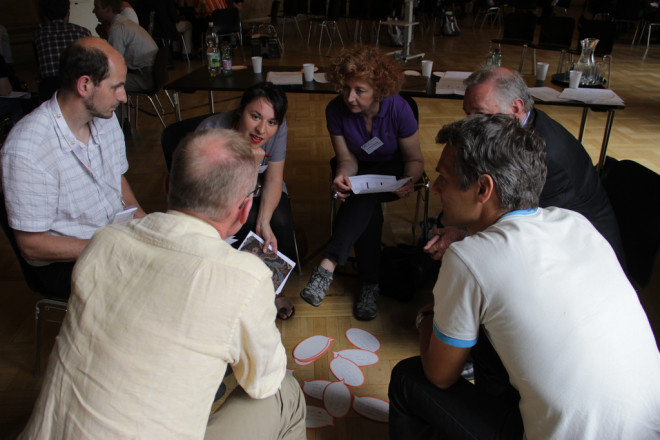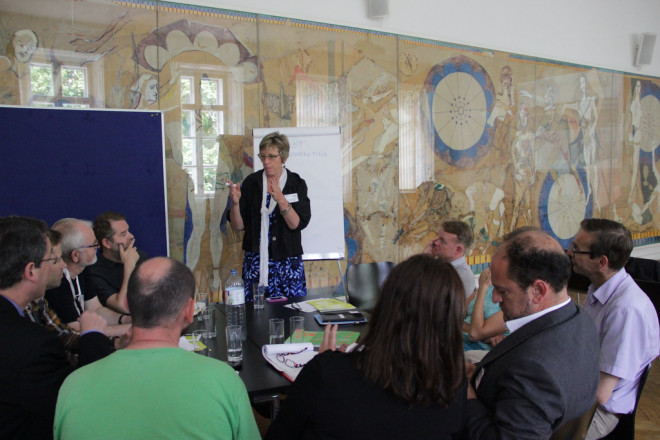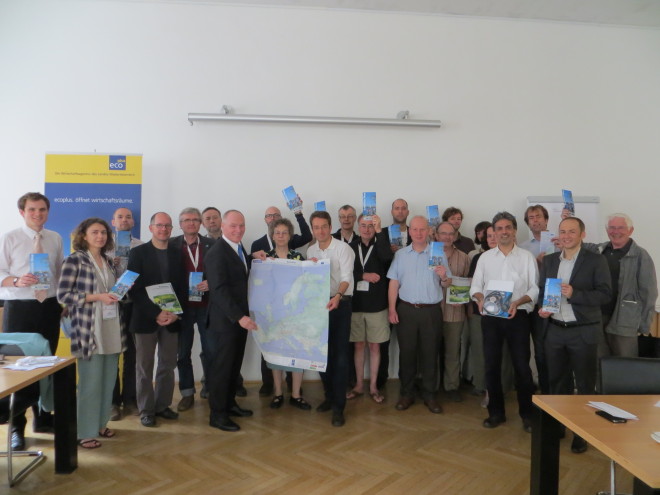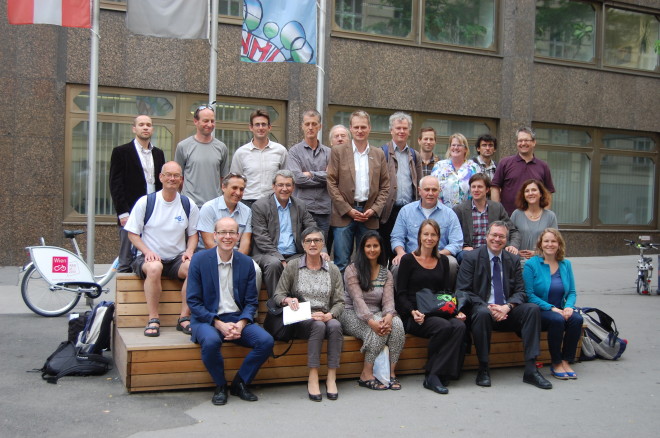
Velo-city Pre-Meetings Roundup: Monday, 10 June
Just ahead of Velo-city 2013 in Vienna, ECF's networks already began to meet to discuss the challenges ahead. As a warm-up for Velo-city, here's an overview on what happened today along with some highlights of tomorrow's opening day at the conference.
- Scientists for Cycling - The Science Behind Doubling Cycling in Europe
- Cities for Cycling
- Annual National EuroVelo Coordination Centres and Coordinators’ Meeting
- European Bicycle Coordinators’ Meeting
- Tuesday Highlights at Velo-city
Scientists for Cycling - The Science Behind Doubling Cycling in Europe
The EU recently embraced the target to double the modal share of cycling to 15% by 2020 which calls for a scientific debate. How can we achieve this goal? What's the science? ECF's Scientists for Cycling network considered this at their all day meeting on Monday, just before the start of Velo-city 2013.
In the regal setting of the Festsaal of the T U Wien Karlsplatz discussions were kick-started by the invitees Bas de Geus, Peter Cox and John Parkin, researchers in three different academic fields, but united by their interest in cycling.
Bas de Geus from the Free University Brussels (VUB) presented the health benefits of cycling, which he said would be nothing short of fantastic if Europe managed to achieve a 15% modal share. Air pollution, coming mostly from cars, "presents much more serious risks to cyclists than to car occupants", he said. Despite this and other risks, he insisted that "the health benefits remain high compared to the risks of not doing physical activity."
de Geus reported that researchers observed that where rates of cycling are high, there are relatively more women than where cycling rates are low. On this basis he said that some have argued for "women to be considered as an indicator species", a kind of barometer for cycling.
Peter Cox, social scientist from University of Chester , shed some light on the more political and sociological side of things. He argued that "we cannot consider that cyclists are free agents, unrestricted" by circumstances and infrastructure, car drivers' behavior, and so much more. In a sly aside, he insisted that there cannot be any kind of evolution of bicycles, "because bicycles do not have sex; changes happen because people make decisions" about mobility.
John Parkin, specialist in segregation and cycling infrastructure from South Bank University London represented urban and city planners. He presented a wide variety of challenges facing cyclists and road planners.
He showed the distinguished academic audience how we all are at risk of functional blindness. He presented a short video where many did not notice that there was a bear "moon walking" across the screen. He concluded by asking two key questions: "Where segregation is appropriate, what are the best methods for overall sharing of the public realm?" and "How can the public realm be redesigned for people rather than motor vehicles?"
During discussions, a question was raised about gender differences and safety. A response came from the audience in the person of Dr Anna Niska, from Swedish National Road & Transport Research. They studied hospital reports on cycling injuries resulting in serious injury or death. They saw that there were many more men as victims than women. Single bike accidents are those where no other vehicle was involved.
Prof Dr Michael Meschik echoed earlier presenters saying that roads need to be made safe for cyclists and pedestrians. "It can't be left up to the individuals to try and cope with conditions built for cars." He said that one important action that individuals could do was to "endorse the EU Parliament's recommendation (27SEP2011) for 30kph zones across Europe.
During the Q & A Benoit Beroud said "We need to put humans at the centre of the calculations and plans for mobility" and he asked Meschik how to influence politicians to achieve better planning. "It seems to work best to involve them and to work together for the long term." according to Meschik
Francesca Racioppi, from WHO, said that she particularly appreciated the discussions and the session where people engaged with experts from other fields. This meeting underlined the value of having experts from a wide variety of disciplines consider the challenges ahead.
"The added value of this network for me as a student is to meet and exchange with people that have very different profiles and visions of cycling" says Chunli Zhao a student at the University of Denmark "It is really helpful for me who is just starting in the field to be able to share with others who work on cycling.
The presentations sparked lively discussions. As much as the challenge is exciting to ECF as a Federation, scientists seem to be ready to accompany the process with hard facts.
Further information:
Parkin announced that he welcomes submissions of papers to the journal Research in transportation business and management for an edition called "Managing Cycling" which he will edit. Please respond to him directly at j.parkin[AT]lsbu.ac.uk by 28 June 2013.
Some of the presentations are now available here.
http://ecf.com/projects/scientists-for-cycling/
Cities for Cyclists
Velo-city without Cities for Cycling, how would that possible? Not at all, of course, said the members of ECF's network of cycling-friendly cities from all over the world, and many followed their call to attend the network's annual meeting in Vienna.
"Cycling cities of the future" was the overarching theme of the session, and it was started by Georg Stratil-Sauer of Vienna's Transport Planning and Mobility Strategies department, speking about Vienna as a "smart city". Deputy Regional Minister José García Cebrian of Andalucia, on the other hand, presented challenges of developing cycling in regions with a low bicycle modal share.
Annick Beaudet from Austin Texas:
"It was inspiring to be part of the Cities for Cycling meeting in Austria today because finally bicycling in the US is gettinginternational recognition and isnow part of the global bicycle movement.
This meeting for us was seen as a first step towards an effective international collaboration."
Herbert Tiemens from Regio Utrecht:
"It is interesting to see so many cities working together on cycling. They have different speeds, different gears but they all go towards the same destination.
We are located in a cycling country but still Cities for Cyclists helps us to keep the lead on cycling and make sure our decision makers are aware of the need to continue working on cycling. Cities for Cyclists entitles us to create funding, to be informed on what happens in the world outside our region."
To better share their experience, members gathered during the afternoon session, discussing how to better network and integrate cycling-friendly cities.
Frederik Depoortere from Brussels:
"It is always great to exchange with cities that face the same challenges as us. The similarities between the cities are much more important than what you would think and much more important than the differences.
Cities for Cyclists also gives us the opportunity to be in contact with cities with similar profile (in terms of size and development of cycling) or just a bit ahad of us thus they can show us the way to go"
Needless to say, many members of the network will be active participants in the upcoming conference.
http://ecf.com/projects/cities-for-cyclists/
Annual National EuroVelo Coordination Centres and Coordinators’ Meeting
EuroVelo will be a theme that is bound to mark this year's Velo-city. "This is going to be a landmark year for the development of the EuroVelo cycle route network, we were excited to have the national EuroVelo coordinators here together in Vienna," says Ed Lancaster who works on EuroVelo at ECF.
Chair Käthi Diethelm could easily have had trouble keeping up with the discussions, as they were covering almost any aspect related to the development of Europe's newest and biggest long-distance cycling route network. As a start, this year's host (Austria), the newest member (Slovakia) and the best performer (Netherlands) were able to present their respective strategies and achievements.
The following sessions were directed towards such questions as the EuroVelo.com website and the business model of the routes - something not to be underestimated when talking about a project of this scale. Also a major topic: sustainability. How to manage the routes in the long term and as a sustainable project?
http://www.eurovelo.org/news/2013/05/06/
European Bicycle Coordinators’ Meeting
More than 25 participants from 15 countries were present at the European Bicycle Coordinators' meeting. "There seems to be a huge interest in communication about national cycling policies," says Fabian Küster, Senior Policy Officer at ECF and in charge of the meeting.
Among other subjects, the meeting focused on "annual themes" this year. "We think it is a good idea if the national cycling coordinators choose a particular topic to work on every year," explains Fabian Küster. Like that ECF hopes to help national cycling coordinators be more efficient with the work they do. "Each coordinator would choose a theme and then either develop a strategy in that field, focus their meetings on that theme, or conduct studies about it, for example," Fabian Küster explains.
Robert Thaler, Head of Department from the Austrian National Ministry of Environment who kindly hosted this event, thanked ECF for putting this meeting together and invited to intensify cooperation within the PEP, a platform of the World Health Organisation (WHO) on Environment, Health and Transportation. Mr Thaler also stressed the importance of national leadership on cycling: “Every Euro we have invested in Austria from the national level triggered another 5-6 Euro’s from regional and local level”. He therefore called upon the European Commission also to develop a European Master Plan on Cycling.
The national cycling officers shortly presented the latest news on their national strategies. Peter Klučka from Slovakia happily announced that the Slovak government had very recently adopted the first national cycling strategy. The objective is to increase cycling to 10 % mode share in cities by 2020.
Newly appointed German National Cycling Coordinator, Birgitta Worringen, referred to the 2nd National Cycling Master Plan 2013 – 2020, and announced as next step the installation of a cross-ministerial working group to streamline policies horizontally across the different departments.
Dominique Lebrun from France explained that the main focus in the new French cycling strategy would be cycling to work. The government therefore looked into how the road code could be amended to cater better for cyclists’ needs, and to introduce fiscal incentives, following the Belgian example.
The meeting also included a briefing about ECF's recent activities, EU cycling policies - such as the inclusion of EuroVelo in the TEN-T plan or the objective to double the modal share of cycling by 2020 - as well as the brand new ECF barometer.
- Log in to post comments
Contact the author
Recent news!
Upcoming events
Contact Us
Avenue des Arts, 7-8
Postal address: Rue de la Charité, 22
1210 Brussels, Belgium













